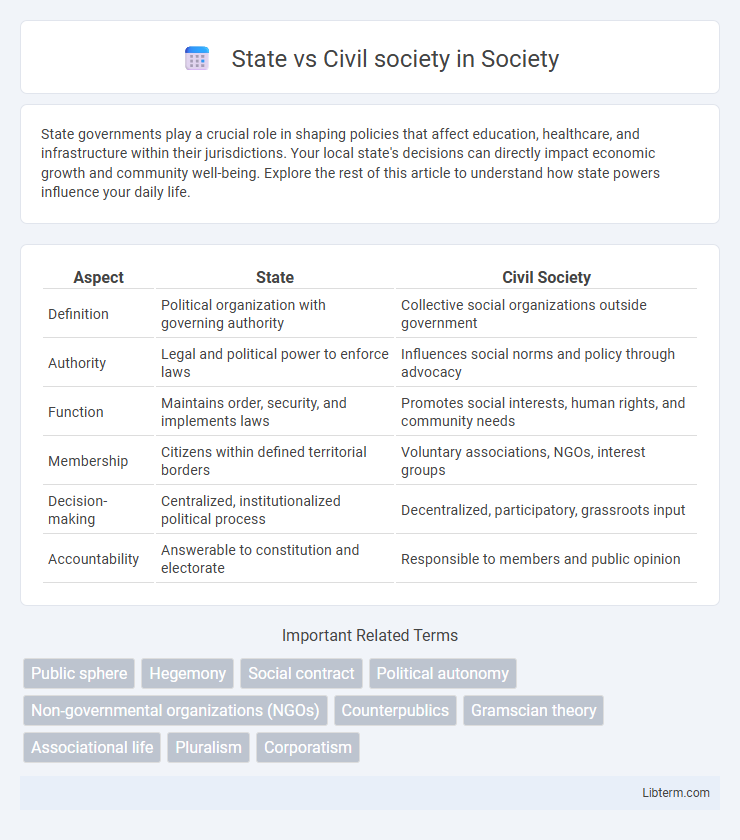State governments play a crucial role in shaping policies that affect education, healthcare, and infrastructure within their jurisdictions. Your local state's decisions can directly impact economic growth and community well-being. Explore the rest of this article to understand how state powers influence your daily life.
Table of Comparison
| Aspect | State | Civil Society |
|---|---|---|
| Definition | Political organization with governing authority | Collective social organizations outside government |
| Authority | Legal and political power to enforce laws | Influences social norms and policy through advocacy |
| Function | Maintains order, security, and implements laws | Promotes social interests, human rights, and community needs |
| Membership | Citizens within defined territorial borders | Voluntary associations, NGOs, interest groups |
| Decision-making | Centralized, institutionalized political process | Decentralized, participatory, grassroots input |
| Accountability | Answerable to constitution and electorate | Responsible to members and public opinion |
Defining the State: Powers and Functions
The state is a political organization with sovereign authority over a defined territory, exercising powers such as legislation, enforcement, and adjudication to maintain order and provide public services. It holds a monopoly on legitimate use of force, enabling it to implement laws, protect rights, and regulate economic and social activities. Civil society, distinct from the state, consists of voluntary associations and institutions that operate independently, contributing to governance through advocacy, social mobilization, and public discourse.
Understanding Civil Society: Scope and Role
Civil society encompasses organizations and institutions that operate independently from the state, including non-governmental organizations (NGOs), community groups, labor unions, and advocacy networks, playing a critical role in promoting social interests and democratic participation. Its scope extends to fostering social accountability, encouraging civic engagement, and acting as a mediator between individuals and government structures. Civil society functions as a vital actor in shaping public policy, supporting human rights, and enhancing societal resilience by addressing gaps left by state and market sectors.
Historical Evolution of State and Civil Society
The historical evolution of the state and civil society traces back to ancient civilizations where early city-states established centralized authority alongside emerging social groups. During the Enlightenment, thinkers like Rousseau and Hegel articulated the state as a sovereign entity distinct from civil society, which comprised voluntary associations and economic interests. The modern dichotomy evolved through industrialization and democratization, emphasizing a complex interaction between state institutions and autonomous civil organizations shaping public life.
Theoretical Perspectives: State vs Civil Society
Theoretical perspectives on the state versus civil society emphasize the state's role as the centralized authority responsible for governance, law enforcement, and maintaining order, while civil society comprises autonomous organizations, interest groups, and social movements that operate independently from the state. Political theorists like Antonio Gramsci highlight civil society as a site of ideological contestation that challenges state power through cultural institutions, whereas liberal theories view civil society as essential for promoting individual freedoms and democratic participation outside state control. These perspectives reveal the dynamic tension between state sovereignty and civil society's capacity to influence policy, advocate for social change, and hold government accountable.
State Authority and Civil Society Autonomy
State authority is characterized by its capacity to enforce laws, regulate public order, and wield sovereign power through institutions like the government, police, and judiciary. Civil society autonomy refers to the independent space where individuals and groups organize voluntarily to pursue collective interests without direct state control. The dynamic balance between state authority and civil society autonomy shapes democratic governance, ensuring both effective regulation and protection of individual freedoms.
Areas of Cooperation and Conflict
State and civil society often cooperate in areas such as public policy formulation, social service delivery, and community development initiatives, leveraging their respective strengths to enhance governance and societal welfare. Conflicts arise primarily over issues of autonomy, political representation, and accountability, where civil society may challenge state policies perceived as oppressive or exclusionary. Collaboration and tension coexist as both entities navigate power dynamics, resource distribution, and the protection of rights within a democratic framework.
Impact on Democracy and Governance
State institutions establish formal rules and enforce laws essential for maintaining order and delivering public services, which directly influence the quality of democracy and governance. Civil society organizations promote citizen participation, accountability, and transparency, enhancing democratic processes by representing diverse interests and holding state actors accountable. The dynamic interaction between state authority and active civil society strengthens governance by fostering inclusivity, responsiveness, and protection of rights.
Civil Society’s Role in Social Change
Civil society acts as a catalyst for social change by mobilizing citizens, advocating for human rights, and holding governments accountable. It fosters grassroots movements that address social injustices and promote democratic participation. By providing a platform for diverse voices, civil society enhances social cohesion and drives policy reforms.
Challenges in State-Civil Society Relations
State-civil society relations face challenges such as mistrust due to differing agendas, limited transparency in government actions, and restrictions on civil society organizations' funding and activities. These tensions often hinder collaborative governance and effective policy implementation. Ensuring mutual accountability and open communication is critical to overcoming these obstacles and fostering a healthy democratic environment.
Future Trends and Global Perspectives
Emerging global trends indicate a shift towards more participatory governance models where civil society increasingly influences policy-making, leveraging digital platforms and social media to amplify citizen voices. The future landscape suggests enhanced collaboration between state institutions and civil organizations to address complex transnational challenges such as climate change, human rights, and cybersecurity. This dynamic interplay highlights the evolving balance of power, emphasizing transparency, accountability, and inclusivity on a global scale.
State Infographic

 libterm.com
libterm.com